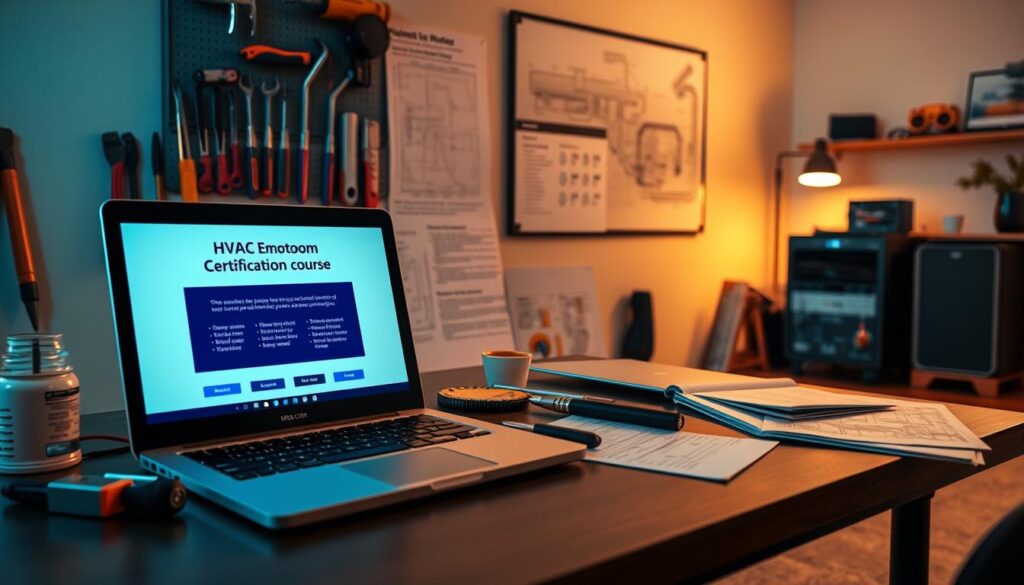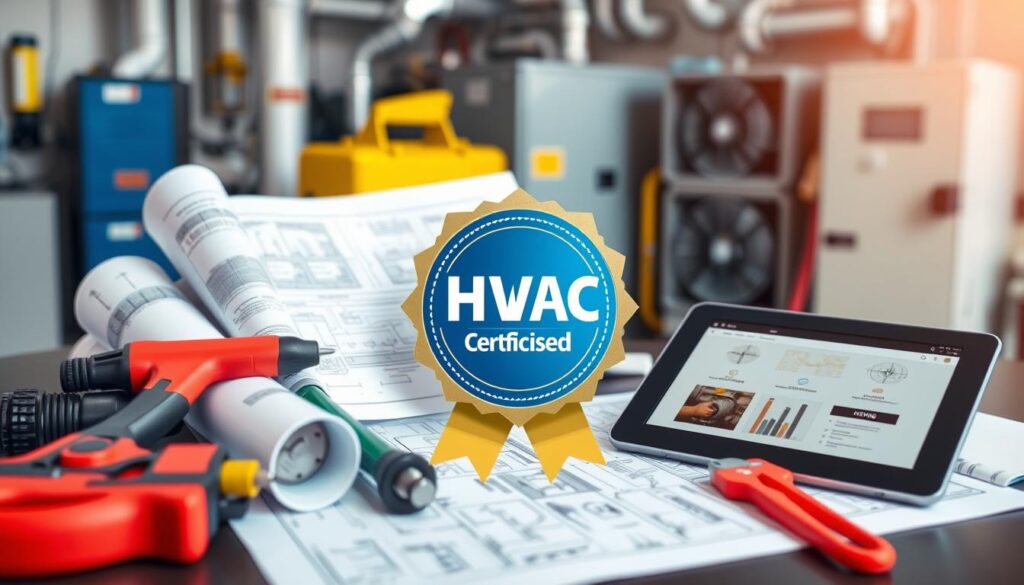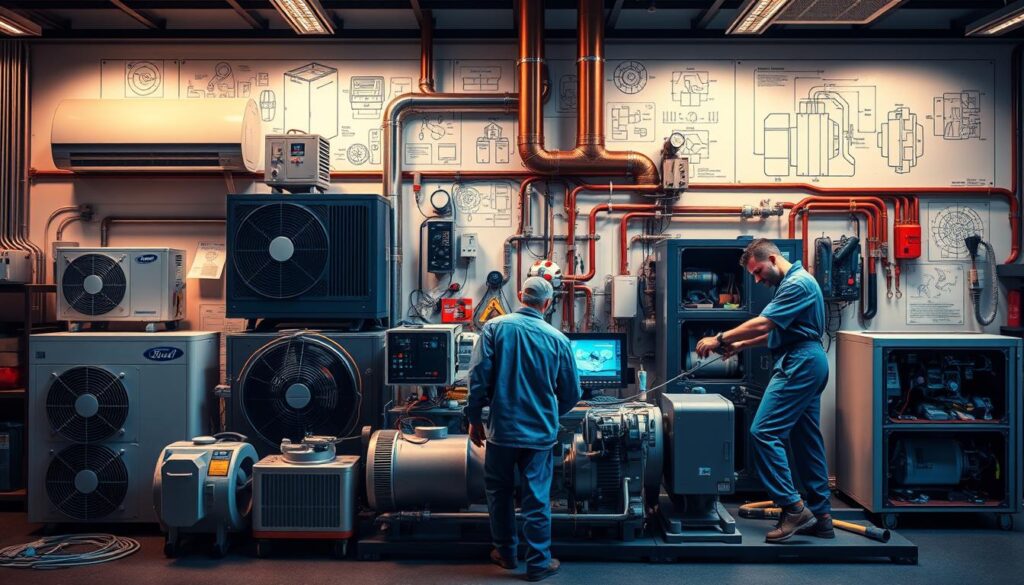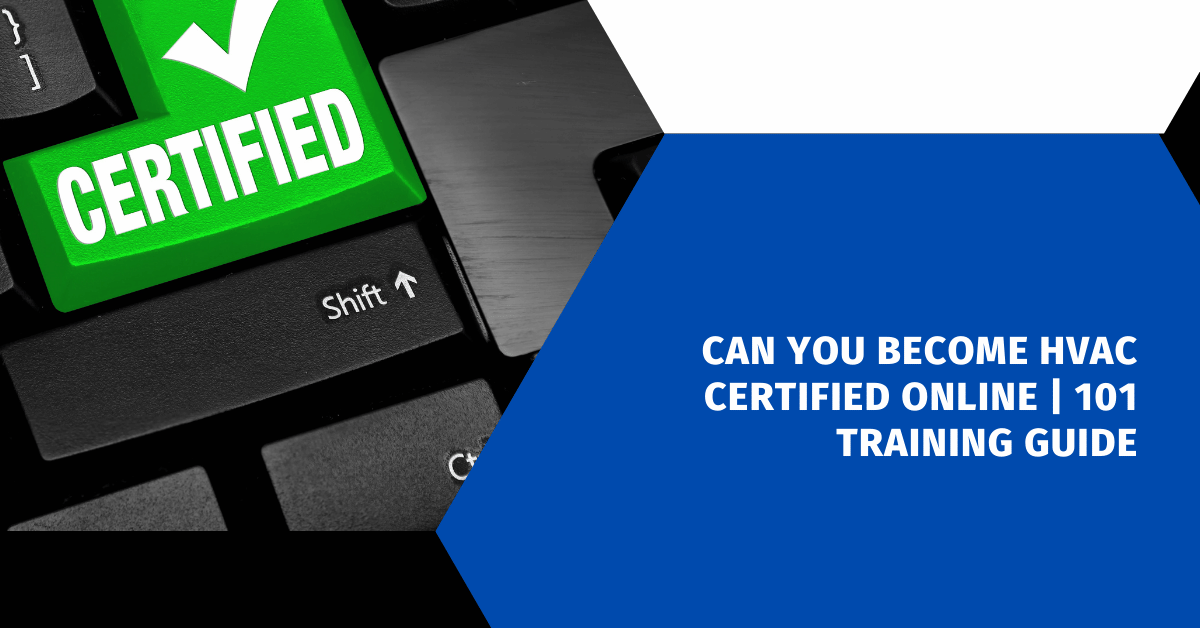Affiliate Disclosure
HVAC Guide Guys is a participant in the Amazon Services LLC Associates Program, an affiliate advertising program designed to provide a means for sites to earn advertising fees by advertising and linking to Amazon.
Can You Become HVAC Certified Online? Are you thinking about a career in the HVAC industry but wonder if you can get certified online? The answer is yes, HVAC certification can be earned online. This way, you get the skills and qualifications needed to thrive in this field. This guide will help you start your journey towards a fulfilling HVAC career.

Key Takeaways
- HVAC and refrigeration concepts can be learned through online programs, but hands-on training is typically required for proficiency.
- EPA 608 certification is crucial for handling refrigerants and can be obtained online for around $10 through SkillCat.
- Online HVAC training programs usually take 6 months to 2 years to complete, covering a wide range of HVACR topics.
- HVACR technician jobs are expected to grow by 5% by 2033, with a median salary of $53,920.
- Accredited online HVAC training programs, such as those offered by the U.S. Career Institute, provide a flexible and cost-effective path to certification.
Table of Contents
Understanding HVAC Certification Basics
Exploring HVAC (Heating, Ventilation, and Air Conditioning) certifications can seem overwhelming. But, knowing the basics is key for those wanting to be HVACR technicians. There are many certifications, each with its own needs and perks. Let’s look at the different HVAC certifications, what you need to start, and why EPA certification matters.
Types of HVAC Certifications Available
There are a few top HVAC certifications. These include EPA (Environmental Protection Agency) 608, NATE (North American Technician Excellence), and HVAC Excellence. These show a technician’s deep knowledge and skill in HVAC.
- EPA 608 certification is needed for those working with refrigerants. It makes sure they know how to handle and dispose of them right.
- NATE certification is optional. It proves a technician’s skill in certain HVAC systems and parts.
- HVAC Excellence certification checks a technician’s knowledge in electrical, mechanical, and troubleshooting areas.
Requirements for Getting Started in HVAC
To start in HVAC, you usually need a high school diploma or the same. You also need to finish an accredited HVAC training program. These programs teach the theory and hands-on skills needed to work safely on HVAC systems.
The Role of EPA Certification
The EPA 608 certification is key for HVACR technicians working with refrigerants. It makes sure they know how to handle, store, and dispose of refrigerants correctly. This is vital for protecting the environment and following rules. You can get the EPA 608 certification through various training providers. It usually costs about $10 if you finish it in a month.
Explore Our HVAC Shop
Looking for top-rated HVAC tools, parts, and accessories? Visit our shop and find the perfect solution for your needs.
Visit the ShopCan You Become HVAC Certified Online
Yes, you can get HVAC certified online. Accredited online HVAC certification courses teach key topics in HVAC/R. These accredited online HVAC programs offer detailed digital HVAC training. They help students get ready for a career as HVAC technicians.
Online HVAC certification programs mix theory and hands-on training. You can learn the theory online, but practical skills are key. Many programs use virtual labs, exercises, and on-site training. This way, students get the hands-on experience needed.
“The HVAC industry offers excellent job prospects, with an expected growth rate of 6% by 2032 and the creation of 51,390 new jobs. Online HVAC certification programs can be a convenient and affordable pathway to starting a rewarding career in this in-demand field.”
It’s important to pick online HVAC certification programs that are accredited. This ensures the program meets industry standards. It also means employers will recognize your certification.
Online HVAC certification is a good choice for those wanting to join the HVAC field. Just make sure the program is accredited and offers both theory and practice. With an online HVAC certification, you can start a fulfilling career as an HVAC technician.
The Value of Online HVAC Training Programs
Online training programs are becoming more popular in the HVAC industry. They offer flexible and accessible education. Currently, only 1.8% of HVAC training is online. But, this number is expected to grow as more people see the value in digital learning.
Benefits of Digital Learning Platforms
Online HVAC training has many benefits. It uses interactive tools, simulations, and videos to teach technical skills. It also includes virtual reality and 3D learning, making it more engaging and effective.
Cost Comparison: Online vs. Traditional Training
Online HVAC training is more affordable than traditional schools. Prices range from $669.00 to $24,480.00, depending on the program. This makes online education more accessible to many students.
Time Requirements for Online Certification
The time to complete an online HVAC certification varies. It can take as little as 2 weeks or up to 10 months. This flexibility allows students to fit learning into their busy schedules.
As the HVAC industry grows, online training will play a bigger role. These programs are cost-effective, flexible, and use innovative digital tools. They offer a great alternative to traditional classroom learning.
Essential Components of Online HVAC Training
To master the HVAC industry, you need to know HVACR theory, have hands-on skills, and get recognized certifications. Online HVAC training programs offer a flexible and engaging way to learn. They cover everything you need to succeed in this field.
At the heart of any good online HVAC program are key topics like HVAC mathematics, tool safety, job site safety, air distribution, electricity, heating, cooling, and refrigeration. Students learn through interactive lessons, animations, and virtual simulations. This helps them understand HVACR theory and how to use it in real life.
Online HVAC programs also prepare students for important certifications, like the EPA 608 certification and HVAC Excellence Employment Ready certificates. This makes sure students have the skills and credentials that employers want. It boosts their chances of getting a job after they finish the program.
Online HVAC training is flexible, with most programs letting you learn at your own pace. You usually have 12 months to complete the course after you start. This gives you the freedom to study while still working or taking care of other responsibilities.
If you want to start a new HVAC career or improve your current skills, online training is a great choice. It’s a flexible and effective way to get into this growing field.
Explore Our HVAC Shop
Looking for top-rated HVAC tools, parts, and accessories? Visit our shop and find the perfect solution for your needs.
Visit the ShopHands-on Experience Requirements
Online HVAC training gives a good start in theory, but hands-on experience is key. Many start by working with experienced technicians. This way, they learn practical skills and gain real-world knowledge.
Practical Training Options
Online HVAC courses often include virtual labs and simulations. But, to really get good at it, you need to get your hands dirty. This means:
- Internships or apprenticeships with local HVAC companies
- Participation in on-site installation and repair projects
- Hands-on practice in designated HVAC training facilities or laboratories
Apprenticeship Opportunities
HVAC apprenticeships last 3 to 5 years. You work with experienced technicians, learning by doing and earning a wage. These programs mix classroom learning with real-world training, offering a full HVAC apprenticeships and practical HVAC training experience.
Laboratory Work Alternatives
If apprenticeships or on-site training aren’t possible, some online courses offer lab alternatives. These include virtual simulations, interactive modules, and hands-on exercises. They help students get the hands-on HVAC experience they need.
“Hands-on experience is crucial for HVAC technicians to develop the skills and confidence needed to succeed in the field.”
State Licensing and Requirements
HVAC state licensing rules change a lot from one place to another. In Missouri, for example, you need a license to work as an HVAC technician. But in South Carolina, Georgia, North Carolina, Texas, Kansas, and Alabama, the rules are different.
To make sure you follow the right rules, you should look into the specific laws in your area. You might need to talk to state and local governments. They can tell you about the HVAC state licensing and HVACR regulations that apply to you.
| State | HVAC Licensing Requirements |
|---|---|
| Missouri | HVAC license required for HVACR technicians |
| South Carolina | Varies by locality |
| Georgia | Varies by locality |
| North Carolina | Varies by locality |
| Texas | Varies by locality |
| Kansas | Varies by locality |
| Alabama | Varies by locality |
Knowing the HVAC state licensing and HVACR regulations in your area is key. It helps you meet all the state-specific HVAC requirements. This way, you can start a rewarding career in the HVAC field.

Explore Our HVAC Shop
Looking for top-rated HVAC tools, parts, and accessories? Visit our shop and find the perfect solution for your needs.
Visit the ShopCareer Opportunities After Online Certification
Getting an online HVAC certification opens doors to many career paths in the HVAC industry. The demand for HVAC technicians is expected to grow by 5% by 2033. This means there will be more job openings across the United States. An online HVAC certification can help you succeed in roles like installation, maintenance, or specialized areas.
Job Prospects and Growth Potential
HVAC technicians are in high demand, especially in areas like Arizona. Employment in Arizona is expected to rise by 31% by 2030. These professionals work on heating, ventilation, and air conditioning systems in homes, businesses, and factories. With various roles available, from refrigeration to commercial HVAC, the future looks bright.
Salary Expectations in the HVAC Field
HVAC technicians can make a median annual salary of $53,920. The top 10% can earn over $76,230 a year. Your salary can depend on where you work, the industry, and your experience. Getting more certifications, like NATE, can also boost your earnings and career.
“The HVAC field offers stable job prospects, with a projected 5% growth by 2033. HVAC technicians earn a median salary of $53,920, with potential for higher earnings in specialized roles like HVAC project managers or engineers.”
If you’re interested in residential HVAC, commercial refrigeration, or industrial systems, an online certification is key. It gives you the knowledge and skills to excel in this fast-paced industry. With the right training and hard work, you can start a fulfilling HVAC career with lots of room for growth.
Advanced Certifications and Specializations
Are you looking to grow in the HVAC field? There are many advanced certifications and specializations to explore. These can help you expand your skills and open new career doors.
The Master HVACR license is a top choice. It lets you oversee other technicians and tackle complex systems. Getting this license requires a lot of experience and extra training. But, it can lead to better-paying jobs, especially in commercial and industrial settings.
You can also get certified in commercial refrigeration. These skills are in high demand. They’re needed for advanced HVAC systems in big buildings, hospitals, and industrial places.
The HVAC world is always changing. Keeping up with new tech and methods is key. Advanced HVAC certifications show you’re an expert. This makes you more attractive to employers.
“Specializations can lead to higher-paying positions, particularly in commercial and industrial HVAC applications.”
Interested in HVAC specializations like energy efficiency or indoor air quality? There are many areas to learn more about. Getting advanced certifications can set you apart in the job market. It helps you grow your career over time.

The HVAC field is always evolving. It’s important to stay current with new tech and methods. By getting advanced certifications and specializations, you show your expertise. This makes you more valuable to employers.
Explore Our HVAC Shop
Looking for top-rated HVAC tools, parts, and accessories? Visit our shop and find the perfect solution for your needs.
Visit the ShopTools and Resources for Online HVAC Students
Starting your online HVAC training opens up a world of digital learning and virtual simulations. These tools and resources are designed to help you understand HVAC systems better. They prepare you for a rewarding career in the field.
Digital Learning Materials
Online HVAC programs offer a wide range of digital materials. You’ll find interactive e-textbooks, video tutorials, and multimedia modules. These resources let you learn at your own pace and revisit concepts whenever you need to.
Many programs also give you access to top software and simulation tools. This lets you practice and apply what you’ve learned in a virtual setting.
Virtual Simulation Programs
One big plus of online HVAC training is the virtual simulation programs. These tools let you interact with HVAC systems, solve problems, and design new systems without real equipment. They help you develop crucial skills for real-world HVAC challenges.
Some schools even offer discounts on professional tools, like the Snap-on Tools discount program. This helps you build your toolkit and stay current with industry standards.
When looking into online HVAC training, make sure to use these valuable tools and resources. They enhance your learning, build practical skills, and pave the way for a successful HVAC career.
Industry Recognition and Accreditation
Getting an accredited HVAC certification is key for those starting in HVAC. Accreditation means your training meets industry standards. It gives you the skills needed to do well in the field. Groups like the Distance Education Accrediting Commission approve online HVAC programs, proving your education’s quality.
Also, having industry-recognized HVAC certifications is a big plus. Certs like the EPA 608 Technician Certification, NATE (North American Technician Excellence) certification, and HVAC Excellence certification show you’re good at your job. They show you’re serious about getting better and can really help your career.
| Certification | Description | Benefits |
|---|---|---|
| EPA 608 Technician Certification | Required for technicians working with refrigerants | Expands job opportunities and demonstrates compliance with environmental regulations |
| NATE Certification | Evaluates technicians’ general HVAC/R knowledge and competency | Enhances credibility and assures clients of technicians’ skills |
| HVAC Excellence Certification | Assesses technicians’ technical proficiency and problem-solving abilities | Helps technicians stand out in the job market and demonstrate their expertise |
Going for industry-recognized HVAC certifications and finishing an accredited HVAC program can really help your career. Employers like to hire people who have put in the effort to get better at their job. They see the value in having the right credentials.
“Certification is crucial for HVAC technicians, as it demonstrates their commitment to the industry and assures clients of their expertise.”
Conclusion
Online HVAC certification is a flexible way to start your HVAC career path. It gives you the basics, but hands-on experience is key for real skills. The HVACR industry future looks bright, with lots of jobs and good pay.
Those interested in HVAC should check state licensing and get recognized certifications. This boosts your online HVAC certification benefits and career chances. With education, training, and dedication, you can have a rewarding HVAC career.
The HVAC industry is growing, and there’s a big need for skilled workers. Online certifications offer a great chance to start your HVAC career. They fit well with your life and career goals.

